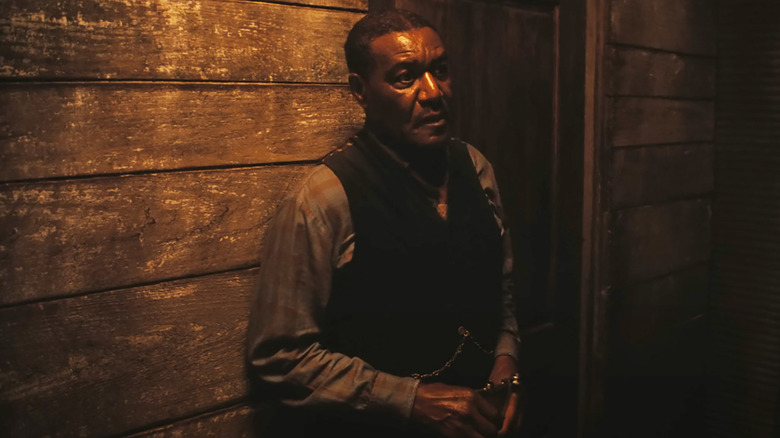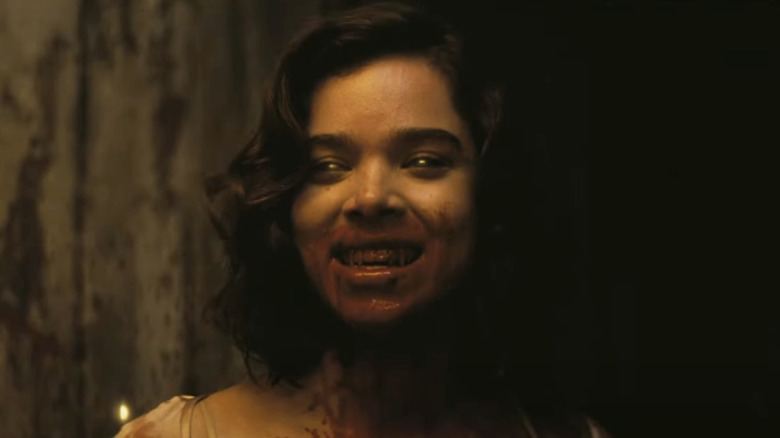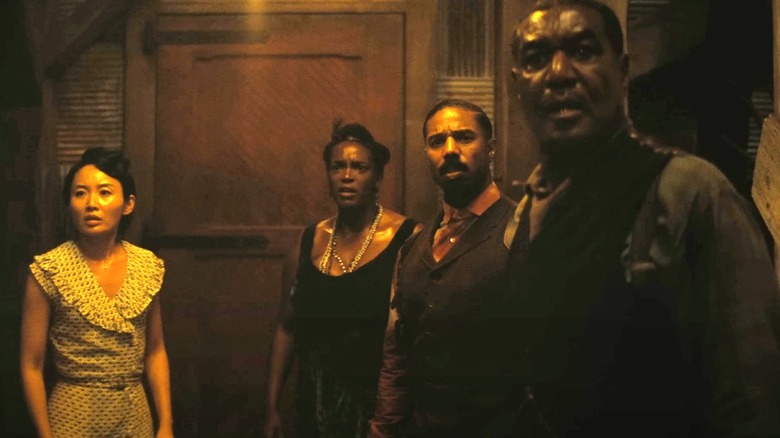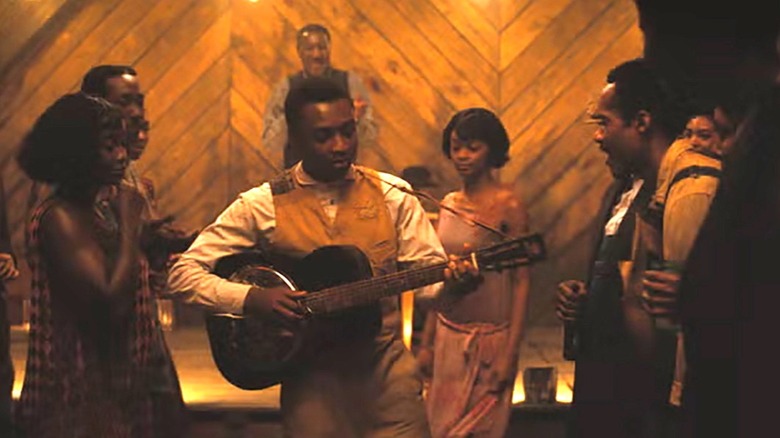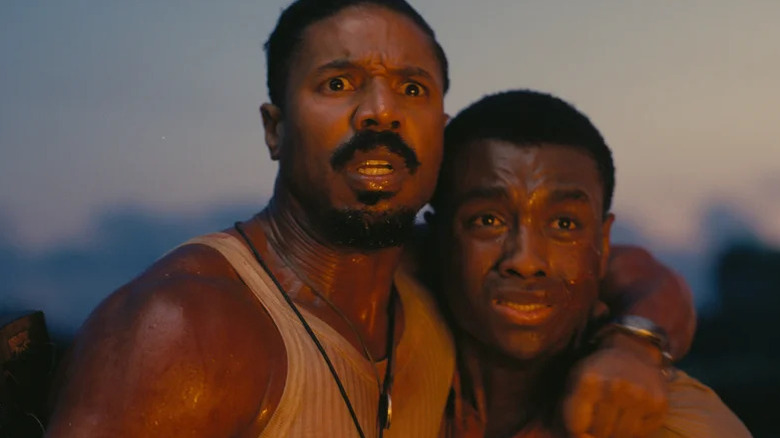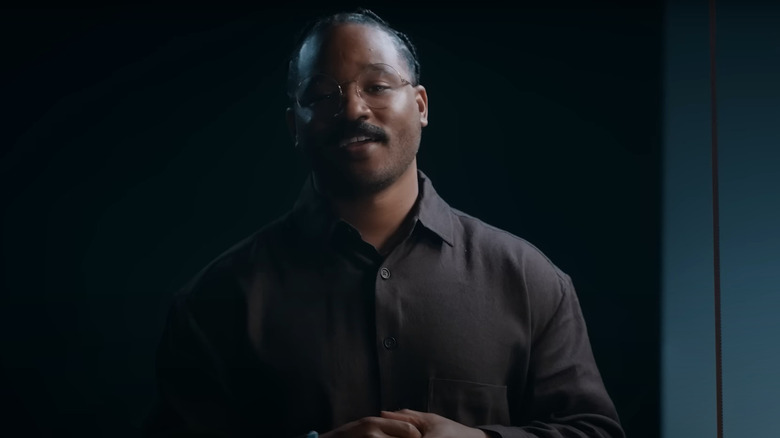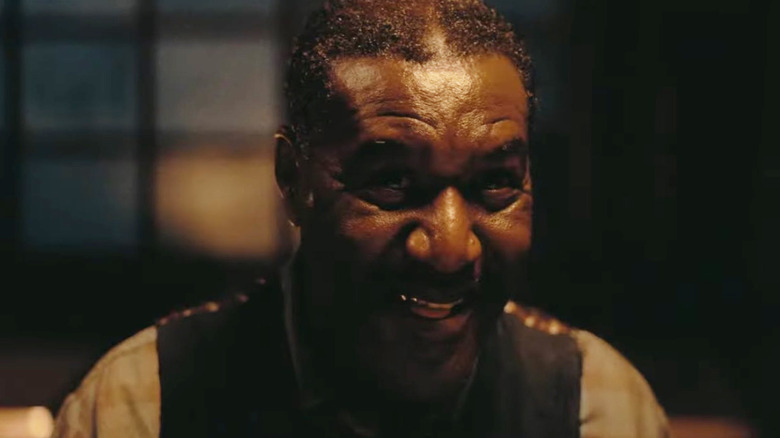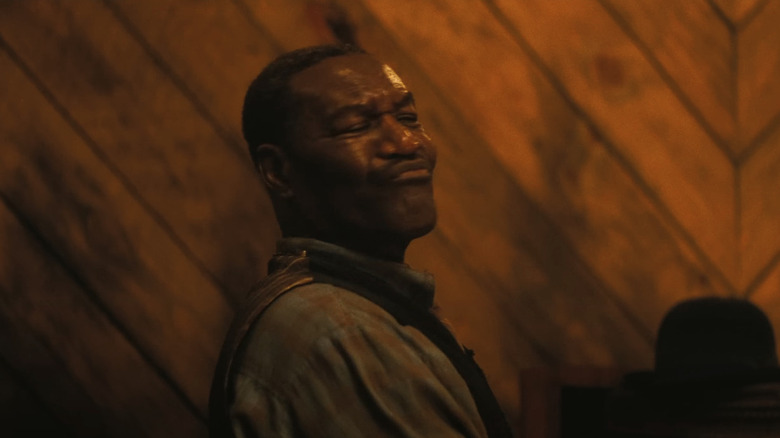Delroy Lindo Didn't See Sinners As A Horror Movie [Exclusive Interview]
Over the years, I've been fortunate to sit down with a medley of gifted creatives — including lifelong heroes and Oscar-winning directors — and part of the job is learning how to quell the sensations of being starstruck to have a human conversation with another person, one who just happens to be a professional working in the entertainment industry. But every so often, I sit face to face with someone whose work I greatly admire and have to fight the fire burning inside me from erupting into "OH MY GOD, I THINK YOU'RE A GENIUS!" This is precisely what happened when I was privileged enough to speak with Delroy Lindo ahead of the release of Ryan Coogler's latest masterpiece, "Sinners."
Delroy Lindo is a living legend, an actor with an esteemed and decades-spanning body of work that proves he's consistently been one of the most captivating men on screen. He managed to take an uncredited role in "Congo" and gave his character one of the most memorable moments in the whole film ("Stop eating my sesame cake!"), and his roles in Spike Lee's "Malcolm X," "Crooklyn," "Clockers," and "Da 5 Bloods" are among some of the best of all time. But beyond being one of the most talented people currently working today, he's also an actor who chooses his projects with purpose. He may be in his 70s, but there are no signs of slowing or stopping, and his latest character of Delta Slim in "Sinners" is proof positive that he's still got plenty of all-time great performances to deliver.
Lindo graced me with an interview discussing Black vampire films, why he didn't read "Sinners" as a horror movie, and what he hopes for the Black filmmakers following in the footsteps of directors like Spike Lee and Ryan Coogler.
This interview has been lightly edited for clarity and brevity.
Delroy Lindo didn't view Sinners as a horror film
How were you approached about joining this project when it was being called "Ryan Coogler's mysterious vampire film?"
I received a text from Ryan that said, "Do you play piano?" And I texted back and I said, "I don't play keyboard, but I took a lot of lessons when I did 'Crooklyn' back in 1993, whatever year that was, in '94." And I think I said, "Why do you ask?" I didn't hear anything. He sent me a couple of additional texts over the next two and a half, three weeks. And then finally, the last text he sent me, I said, "What's this about, man?" And he said, "I have a project I want to talk to you about." We set up a Zoom, and it developed from there.
I love that he's kind of breadcrumbing you a little bit of like, "What can you do?" to get you in here.
What's interesting, though, when I said I didn't play piano, I thought, "Well, maybe he went and found somebody who could play piano." I didn't know.
A lot of actors are apprehensive about dabbling in a genre like horror because there's this misconception that horror movies are inherently lesser-than. Was there any hesitancy about that with you?
I have to tell you, I never saw the film as horror. I didn't see it as a horror film. When I read the script, I interpreted the story to be about what happens when a community is infiltrated and turns on itself. That's how I responded to the script. And I told Ryan that's what I felt. I told him. I gave him my impressions after having read it once, and he affirmed my impressions. Not only did he affirm my impressions, but I also told him where I thought the script needed work, and he agreed with me. So from day one, we were on the same page in terms of the direction that we wanted to take the work.
Sinners is grappling with bigger issues than fictional monsters
I think people often forget that we use horror terms like vampire to describe real people. We don't actually mean that they're bloodsucking vampires, but we mean the people that take things from you, the people that attack you.
Amen. Amen. Can I say something really quickly?
Of course. Say everything.
As I've been talking to your colleagues, I've come to the conclusion that the horror that's associated with this narrative is what happens indeed when a community turns on itself, what happens when that community starts to exert violence on itself within itself, which is intra violence. And in that sense, it's a very contemporary story. And it's a story that we as Black people, we struggle with that because quite a bit of the violence that takes place in our communities is, we inflict it on ourselves. So it's very contemporary in that sense, from that standpoint.
I think there's also this layer of how assimilation won't save you. Assimilating into what these vampires are bringing, even when they're taunting and they're like, "Join us. It's better this way." Is it? Because you're vampires now.
You know what? That's brilliant. Assimilation won't change you. What I've loved about talking to yourself and various of your colleagues, the takeaways that people have. One lady came in here, and she said it made her think about freedom. What is freedom? Is freedom even a real concept? I love that because what it affirms and confirms for me is indeed this film, this story, is about more than the genre that it's set in. It's much bigger than that, and it's grappling with bigger issues.
Delroy Lindo says Ryan Coogler is 'presenting the continuum'
I think the scene in the juke joint where everybody's dancing and the music is playing is one of those magical moments where, as a viewer, you sit there and you have the realization, "I'm watching brilliance in action." I'd love it if you could talk about what the energy was like on that day when you had all of these generational representations of Black music and Black artistry all converging into one scene.
I did not know that the scene would work as well as it does when we were actually filming it. I was not aware of that, but I was aware of the narrative reach. I was acutely aware of what Ryan as a storyteller was reaching for. And I was all in because I knew what he was going for, and I was more than happy to be part. I didn't know how I would fit into that journey, but I was more than happy to be in the scene, part of that journey, telling that aspect of the story.
Because what he's saying very, very clearly is, the musical tradition that comes from this community, that comes from our community, that comes from African people, that comes from African descended people, I'm presenting you the continuum in all of its manifestations from the drum, the African drum, through to hip hop, through to scratching on a turntable, through to classical European ballet, through to the Chinese monkey. If Li Li were here, she would articulate it much more eloquently than I am. But the two representations of Chinese history and culture, he had all of it. So what he's doing is presenting the continuum, and the strength, and the brilliance, and the genius of that continuum.
It was like a breathtaking scene. I was already all in on the movie, but that scene hits, and that's when you're like, "There it is."
There it is. There it is. And how does that scene quote unquote "end?" The pin that's put in that scene is those three people watching, and you see it in Remmick's eyes in his whole being: The lusting, "That's what I want." It's brilliant storytelling as far as I'm concerned, brilliant storytelling.
And that is the moment where just everything in your body just drops because we know how this is going to end. We know what happens when white people are coveting; it's a lot to process.
And lusting after. Coveting and lusting after. Yes, absolutely.
Sinners takes its place in Black vampire history
Folks are rightfully praising Michael B. Jordan in his dual role, but something that I think also deserves to be paid attention to is how effortlessly the cast was able to make it clear which twin they were talking to based on their shifts in chemistry. So what was it like for you as an actor having to play opposite of someone else in a dual role?
Well, we were helped immeasurably in those sections of the work because a young actor by the name of Percy Bell, who, when Michael was playing Stack, was performing Smoke. When Michael was playing Smoke, Percy was playing Stack. And Percy had a very challenging job because the space that Percy had to fill was creative in terms of going full bore in the scene and giving us actors what we needed, but it was also very technical because there were very specific movements, very specific physical positions that he had to adopt that Smoke or Stack would be creating on the other side of the scene. And so he had to be very precise about what he was doing, but he helped us immeasurably in terms of manifesting acting in those scenes.
Kudos to Percy! I was doing a little bit of digging through my horror history encyclopedia that is my brain, and William Crain and William Marshall broke new ground with "Blacula" –
Blacula!
The first vampire film to have Black lead actors and a Black director. And I was trying to figure out how often this happens in the vampire genre. We have "Ganja & Hess" and Spike Lee's "Da Sweet Blood of Jesus" — his interpretation of "Ganja & Hess" — and that's kind of it. There are a lot of incredible Black vampire films, but it's very rare that a Black vampire film also has a Black director. So what is it like for you to be a part of a project that is changing this upsettingly low number?
I'm thankful. I'm grateful. I don't think of my trajectory as an actor, I don't quite think in those terms until somebody such as yourself brings it to my attention. I'm thrilled to be part of that trajectory. I'm thrilled to be part of that continuum. And I hope ... I kind of sort of know better [laughs], but I hope it starts a trend of work that continues to push the medium forward in terms of supernatural storytelling that we are protagonists in.
We should all be talking about Ryan Coogler
When people see "Sinners" and they go off into the night, what sort of conversations are you hoping they have on that drive home about the movie?
It's very broad, my answer. When you think about your response to the film and the thoughts that you've had, the kinds of thoughts that have been engendered, I hope that they are the kinds of conversations about what happens when certain people show up and lust after the gifts that we have. I want that to be a part of the conversation. I want a discussion about freedom. One of your colleagues came in here and said, "It messed me up because it got me thinking about freedom. And what does freedom mean? And is freedom even a real practical reality?" I want people to talk about that. I want people to talk about, as you said, "Whoa, why is it that the genre, this genre of films that have Black protagonists, why is it so tiny? What do we do about that?" I want that to be part of the conversation.
I want people to talk about Ryan Coogler, man, a supreme filmmaker. And look what he has done. And he's just added yet another supreme achievement to his very young resume. This is a cat, how old is Ryan? And he's got "Fruitvale Station," "Creed," "Black Panther" 1 and 2, and then he has this. And this is unique: every single film that he has shared with audiences has been both critical and commercial successes. How many filmmakers — I don't care how old you are — how many filmmakers can say that? It feels very particular as a creative worker to be part of that, I want to say, community. And I say "community" in hopes that Ryan and I can work together again in the future.
I push back against it when people like to pit directors, especially if they come from a similar marginalized community, where it's like, "Ryan Coogler's the next Spike Lee. Ryan Coogler's the next whoever."
Amen!
But it's like Ryan Coogler is Ryan Coogler. And he's making incredible, incredible work.
All day long.
Delroy Lindo hopes Sinners marks a paradigm shift
On that note, when you work with him, what is the magic spark? Because I feel like everyone who's worked with him is like, "There's just something about him. He just gets it."
Okay, but before I answer that, I will say that the work is made also for people like yourself who get it. The work is made for people like yourself who say, "No, Ryan Coogler's not the next anything. Ryan Coogler is Ryan Coogler." And I believe the reason that you can discern that is because you're plugged into the humanity that we bring, your own humanity. And you know, in terms of your own humanity, that you are an individual. Your ethnicity aside, whatever your ethnicity is, it doesn't matter. It does matter in as much as you claim that, and that's part of who you are. But in terms of what you do in the world, don't compare yourself or any of us to anybody else. We are all individuals forging our own paths.
But to your question, this is such a difficult industry. Look, life is difficult, but to be engaged in this creative arena, and the kinds of challenges and obstacles that get placed in front of us because of who we are, not because of what we do, because of who we are and who people perceive us to be, the kinds of challenges that are placed in front of us that we have to navigate every single day, I'm hopeful ... I kind of sort of know better, but I'm hopeful that it's a paradigm shift. And I am thrilled to be part of paradigm-shifting work, both for myself as a creative worker and to be connected to this kind of work.
Because I've said it a bunch of times over these last few days, this is why I became an actor. I didn't become an actor because I wanted to say to audiences, "Ooh, ooh, ooh, look at me, look at me, look at me." That's not why I became an actor. I became an actor because I wanted to be involved with work that spoke to and changed in some way the human condition. And I know that sounds really lofty, and I understand. It sounds kind of highfalutin, but that's what I wanted to do. I wanted to be involved with work that made people think and maybe, in some instances, changed the way people think.
So, a long-winded answer, but it's really gratifying and rewarding to be involved with this director at this point in his career, making this kind of work, and sharing this kind of work with audiences.
In a perfect world, Sinners will open the door for new voices in filmmaking
Ryan Coogler is making that work, like everything that he touches, I think, because he's now established himself as this name that, four quadrant mainstream ... everybody knows, they're going to dial in. They're going to lock in and pay attention to his work.
I pray so. I pray so. And while, on some level, yes, there's a connection between Spike Lee and Ryan Coogler, for instance, and of course there are many other directors out there working, I'm talking about those two because they are part of my direct experience. Because, indeed, there's a connection between Spike Lee and Ryan Coogler, that doesn't mean that they're each not their own persons, their own human beings telling their own stories. Stories that are important to them. So it's a dichotomy. And it's a really interesting dichotomy.
And I think you asked a question about what I want "Sinners" to do. I hope that's part of the conversation. How do we make space for filmmakers coming up? But maybe that's not the question. I just hope that filmmakers coming up make their own space, so in two, three, four years, we're talking about another young filmmaker who has done something, who has engaged work that shifts the paradigm, and that causes us to say, "Oh dang, we have Spike Lee, we have Ryan Coogler, and now this person, and the person coming behind them." I pray to God that's what happens. I don't know if it will happen. I'm not naive about the world that we live in, but in a perfect world, I would love for that to be one of the results of a film like "Sinners" and the career of somebody like Ryan Coogler and Spike Lee.
"Sinners" is now playing in theaters everywhere, including IMAX.
